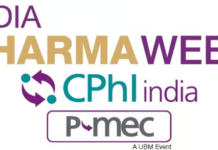New Delhi, June 09, 2017: Shri J P Nadda, Union Minister of Health and Family Welfare was conferred the WHO Director-General’s Special Recognition Award for global tobacco control, here today. The global recognition was presented to him by Dr Poonam Khetrapal Singh, Regional Director, WHO South-East Asia at the ‘National Consultation on Accelerating Implementation of WHO Framework Convention on Tobacco Control (FCTC) for achievement of SDGs’. Shri Faggan Singh Kulaste and Smt Anupriya Patel, Ministers of State for Health & Family Welfare, were also present at the occasion.
Accepting the award, Shri J P Nadda said that it is recognition of the collective endeavor of the Ministry, members of NGO, social activists, civil society organizations and many more who are not present here, but are contributing to this cause day in and day out in their own ways across the country. “Tobacco is a prime driver of poverty and it affects the family as a whole, the community and the country and requires a multisectoral approach to control it. It has rightly been identified as a development issue. I am happy that tobacco users have reduced by 81 lakhs and youth consumption of tobacco sees marked decrease”, Shri Nadda further stated. “My focus has always been on youth. My mantra for success in tobacco control efforts is “Catch them Young”. I am very pleased to note, therefore, that there has been a 54% relative reduction in prevalence of tobacco use among minors (15-17 years) and 28% reduction in the age group of 18-24 years. Further, age of initiation among youth has also increased by one year,” Shri Nadda elaborated.
Shri Nadda said that India has come a long way in controlling the use of tobacco. “We have implemented large pack warnings with 85% pictorial health warnings on both the sides, conducted second round of Global Adult Tobacco Survey (GATS), strengthened & upscaled cessation facilities with the launch of the toll-free national tobacco Quitline and mCessation services and have made substantial investment under the 12th Five Year Plan for expansion of National Tobacco Control Programme – which has been recognized by WHO as a best practice in its Global Tobacco Control report, 2015,” Shri Nadda informed. The Health Minister further said that India has also put a ban on smokeless tobacco products and has strengthened the implementation of the Tobacco Free film and television policy.
Speaking at the function, Shri Faggan Singh Kulaste Minister of State for Health & Family Welfare, stated that there is a need for a social movement with all the stakeholders including states participating in it for controlling the tobacco use. Shri Kulaste reiterated the importance of awareness campaigns about tobacco use in schools and colleges in both rural and urban areas. He further said that alternative job/employment avenues for tobacco growers needs to be thought of and deliberated upon.
Smt Anupriya Patel, Minister of State for Health & Family Welfare, stated that with 27 crore users, tobacco consumption in India is second largest in the world. She said that the Centre and State must have dedicated tobacco control cells. Smt Anupriya Patel also highlighted the measures taken by the Ministry through FSSAI to control tobacco use.
Congratulating the Union Minister of Health, Dr Poonam Khetrapal Singh, Regional Director, WHO South-East Asia said, “Mr Nadda has accelerated India’s tobacco control initiatives and taken bold measures to protect people against multiple health, economic, social and development hazards of tobacco use.” Speaking on the occasion, she stated that more than 100 million lives have been lost to tobacco in the 20th Century. She stressed on the tobacco control at the initial stages and said that more focus should be on youngsters.
Also present at the event were Dr. Jagdish Pradesd, DGHS and Dr. Arun Kumar Panda, Addl. Secretary along with other senior officers of the Ministry and representatives from donor partners, health experts and NGOs.























